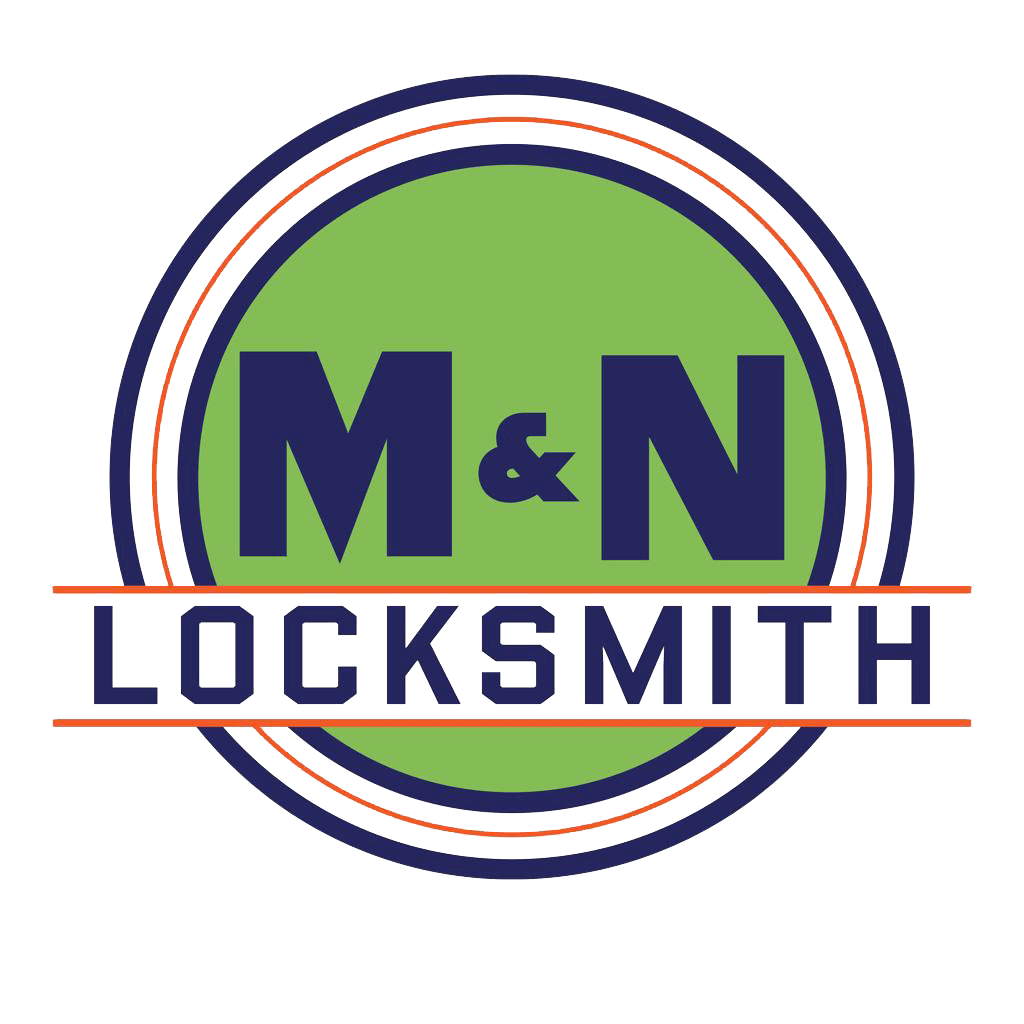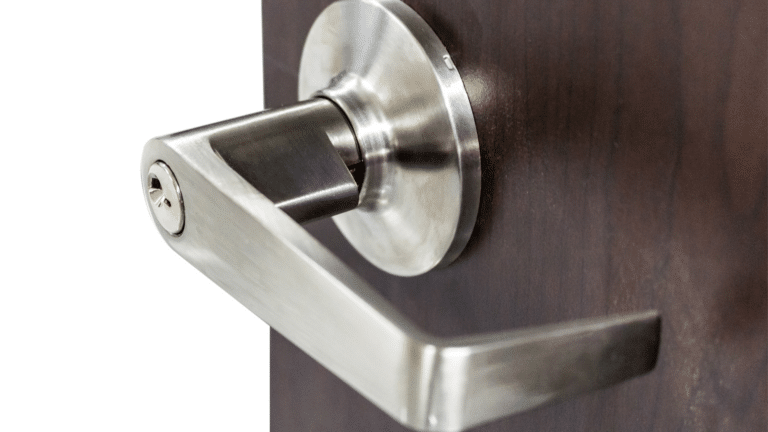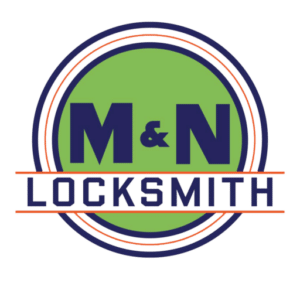When it comes to ensuring the security of your home or office, a reliable lock is essential. One popular type of lock that you may have come across is the lever handle lock. Widely used are lever handle locks for their ease of use and enhanced security features.
Let us now delve into;
- What does a Lever Handle Mean?
- The Functionality of Lever Handle Locks
- Advantages of Lever Handle Locks
- Common Types
- Tips to Help You Choose The Right Lock for Your Needs
- Installation and Maintenance
- Troubleshooting and Common Issues
- When To Call A Professional Locksmith
- Security Features and Enhancements
What does a Lever Handle Lock Mean?
A lever handle lock is a kind of door lock that consists of a lever on one side while on the other side it has a key-operated cylinder. The latch mechanism, which operates through a lever handle, comes into operation from this side to open or close the door. Lever handle locks, commonly used in residential and commercial settings, utilize a key-operated cylinder for unlocking and locking the latch mechanism.
How Does a Lever Handle Lock Function?
The operation of a lever handle lock is fairly simple. Once you lower the lever handle, it activates a latch mechanism that allows the opening of the door. A key-operated cylinder controls the movement of the latch mechanism. The cylinder aligns its internal components, allowing retraction of the latch and opening the door. When raised upwards, it extends, ensuring security. The key can block an unauthorized manipulation attempt.
Most manufacturers’ designs for lever handles usually consist of more than one lever within this locking system; therefore, the number depends upon the desired level regarding security matters. Each pair interacts with specific matching sets involving troughs within each subsequent row such that once inserted and twisted they do so by aligning themselves with these depressions allowing rotation at this point if necessary through which they actuate these latching mechanisms.
This complex design makes lever handle locks difficult to pick and tamper with, making them more secure.
Advantages of Lever Handle Locks
Lever handle locks offer numerous benefits that make them popular among homeowners and businesses. The first one is their simplicity in use. When gripping handles while operating levers, they are designed to offer a comfortable and relaxed feel. This is very helpful specifically to those people who have weak hands like the old ones and physically challenged individuals.
Furthermore, it is easy to lock or unlock lever handle locks since it will take just simple movements instead of twisting or gripping like knob locks do. In higher-traffic places, these can be vital particularly if you need quick entry during urgent situations.
Thirdly, unlike other types, lever handle locks can be installed in different forms including interior and exterior doors among others. This door lock offers a variety of styles and finishes, allowing customers to customize their purchase to match their room’s decor.
Common Types of Lever Handle Locks
Lever handle locks exist in different types which offer various features and security levels. Some common types of lever handle locks available on the market include:
Grade 1 Lever Handle Locks
Grade 1 lever handle locks are the most secure and durable option available. They are designed for heavy-duty commercial use and provide maximum resistance against forced entry. Grade 1 locks are constructed with solid materials and undergo rigorous testing to ensure superior performance and longevity.
Grade 2 Lever Handle Locks
Most of us would go for a grade one lever handle lock since it is more secure than any other type of lock. It is typically used in heavy commercial applications to provide maximum protection against unauthorized access. Grade two locks can be used in both home premises as well as low-duty commercial premises such as boutiques.
Keyless Entry Lever Handle Locks
But nowadays, lever handle locks have electronic keypads or biometric scanners on them instead of keys as a means of entering your home without requiring physical keys, henceforth eliminating the chances of being locked out anymore, even if you lose your keys around the house. The great thing with these keyless entry lever handle locks is that they require neither keys nor cards but just need a unique code number or fingerprint to operate them.
Privacy Lever Handle Locks
Examples of privacy lever handle locks include those used in bedroom doors and bathroom doors commonly found in homes today. These locks usually have a button that can be pushed or twisted from inside thus making it possible to be locked from within using this mechanism while not necessarily requiring a key. This choice does an excellent job at protecting privacy inside rooms yet allowing easy exit when there’s an emergency.
Choosing the Right Lever Handle Lock for Your Needs
To choose the optimal lever handle lock, consider various factors to achieve the best fit for your needs. Here are some crucial factors that you should keep in mind:
Security Level
Assess the security requirements of your building based on its safety needs, such as installing grade 1 lever handle locks for high-security situations or grade 2 locks for residential or light commercial applications.
Durability
Try to find out which are the materials that manufacturers use in making these locks; solid brass or stainless steel are some examples that you can look for. Any of the above two materials is not only strong but also resistant to rust and corrosion thereby giving your lock a long life span.
Aesthetics
If you have an overall theme for your space then it would be wise if you bought a lever handle lock that matched with the other finishes. Lever handle locks come in different colors including polished brass, satin nickel, and oil-rubbed bronze.
Functionality
Do you want some with keyless entry or just normal privacy locking? Furthermore, how do you plan to use this particular lock? For example, if you need it at home or an office set up where one wants privacy most times then a better one should go for those that can suit his/her needs.
Budget
Come up with an approximate amount that will be used in buying lever handle locks within your reach. However, much security is important yet economic pressure calls for cheaper but reliable locks. Compare prices and features to make the right decision on which lock to buy.
By considering these factors we hope we will help make a more informed decision on what type of lever handle lock suits our needs best in terms of security, functionality, and the overall beauty of the room.
Installation and Maintenance of Lever Handle Locks
Proper installation is paramount when putting up such kind of door openers; after finding one’s choice among them as advised by various locksmiths. It is advisable to seek professional services from competent locksmiths to ensure accurate and safe repairs, especially during emergencies like fire incidents. A professional locksmith installs a lock perfectly, understanding what is required.
Your lever handle lock will last longer when you do regular maintenance on it. Here are some tips to guide you.
- Clean the Lock: It is important to keep the lock clean at all times using a mild detergent and a soft cloth. Avoid using harsh chemicals or abrasive materials that could ruin the finish of your lock.
- Lubricate the Lock: To prevent friction and ensure smooth operation, put some little graphite or silicone lubricant in the keyway and moving parts of your lock.
- Check for Loose Screws: Periodically check on any loose screws on your lock, and tighten them if necessary. This is because loose screws can affect its performance as well as security.
- Inspect the Door: Carry out regular inspections on both the door and its frame to identify any signs of wear or damage. Lever handle locks’ optimum functionality depends largely on properly functioning doors.
By following these maintenance practices, you can extend the lifespan of your lever handle lock and ensure its reliable operation.
Lever Handle Lock Troubleshooting and Common Issues
While lever handle locks generally provide dependable services, sometimes they might develop faults or stop working as expected. Below are some common troubles that occur with this type of lock:
- Sticking or Jammed Lock: When there is trouble turning a stiff locked door knob or when it feels stuck, then build-up of dirt or debris inside the locking mechanism is a likely cause. Use a can of compressed air to blow away particles and then lubricate with graphite or silicone spray.
- Misalignment of Latch and Strike Plate: If the latch does not align correctly with the strike plate, then latching or unlatching may be difficult hence indicating a problem with the locking mechanism. Ensure proper alignment by adjusting the position of the strike plate accordingly.
- Key Turning but Not Operating the Lock: The key turns but doesn’t work might show an issue relating to internal components inside your lock such as a damaged keyway. If such instances are encountered, it may be necessary to seek advice from locksmiths for proper diagnosis and repair.
- Loose Lever Handle: Whenever the lever handle seems to be loose or wobbly, just check the screws. In case they are loose, tighten them or replace worn-out internal parts. And if you cannot find anything wrong with it, then look at replacing the handle itself.
Remember, if you are unsure or unable to resolve any issues with your lever handle lock, it is always advisable to seek the assistance of a professional locksmith.
When to Call a Professional Locksmith for Lever Handle Lock Services
Although lever locks are known for their easy installation and maintenance, there are certain instances where one can require the services of a professional locksmith. Here are some situations where it is best to call a professional locksmith:
- Lockout Situations: If you have been locked out of your property due to problems with your lever handle lock or lose keys; then this is when you should reach out for the help of a qualified locksmith who will open without damaging either the door or the lock.
- Lock Repairs: When you realize some things are going on with your lever handle lock that you cannot manage by yourself such as breaking the key into pieces, spoiled inner components, and an ineffective locking mechanism, among others; consult a specialist to assess what might be wrong and do any necessary repairs.
- Lock Rekeying or Replacement: A new baby in town? Well, maybe moving into an unfamiliar area could also put someone in fear of being attacked within his/her compound. Such times will necessitate having a locksmith alter pins inside the cylinder as well as advise on better alternatives just in case replacement becomes necessary.
- Security Upgrades: For anybody who would want to enhance property security, the current standard security level of your lever handle lock can be assessed and recommendations for any additional security features or upgrades such as installation of a deadbolt or smart lock system can be made by a professional locksmith.
This way, leveraging a professional locksmith’s expertise will ensure that your lever handle lock is properly serviced and all issues are resolved efficiently and effectively.
Lever Handle Lock Security Features and Enhancements
Lever handle locks incorporate various security features and enhancements to offer better protection for properties. There are certain common security features you should look for:
- Anti-Pick Technology: The latest line of lever handle locks coming with anti-pick technology has introduced highly complex mechanisms that make them very hard to pick or manipulate. These locks also enable the owner to feel more confident about unauthorized access not occurring.
- Key Control: Some lever handles have key control systems that restrict the duplication of keys. With this feature, unauthorized persons may not be able to copy keys thus adding another layer of deterrent against unauthorized key copying.
- Bump Resistant: Bumping is a technique burglars use to bypass traditional pin-tumbler locks. To enhance the security of your property, you must use lever handle locks with bump-resistant technology since most burglars break in through doorways.
- Smart Lock Integration: By linking up with other smart lock systems, lever handle locks become easily manageable through smartphones or other smart devices. Keyless entry, remote access, and activity logs are some of the smart lock features that provide convenience and improve security at home.
An expert locksmith should be consulted first for identifying and implementing necessary safety improvements and heightened protection for the premises.
Conclusion
They are good choices for both residential and commercial purposes due to their reliability as well as convenience thus ease of use. Property owners find them appealing because they eliminate concerns about how easy things can be. To effectively choose the right lever handle lock for your home, you need to become familiar with their operational aspects, consider their merits, and examine the available types.
Ensure that any issues arising from installation, good maintenance practices, and speedy resolution are taken care of, the efficient performance of your lever handle lock system. In case of doubts, you should always rely on professional locksmiths for reliable and expert services.
In summary, lever handle locks provide you with both security and convenience to make sure your property is safe while keeping an eye on your loved ones. Acquire a high-quality lever handle lock today and benefit from seamless security solutions.
Frequently Asked Questions
1. Is it possible for me to install a lever handle lock myself?
Although it may be possible to install a lever handle lock yourself; hiring a professional locksmith will ensure that it is installed safely and smoothly.
2. Do lever handle locks work well both in homes and commercial buildings?
Yes, they are versatile enough for different kinds of doors such as those in households or establishments…
3. Can I get my lever handles keyed alike?
Indeed, this alternative allows multiple locks to use one key thus saving time by preventing having too many keys.
4. Are knob locks less secure than lever handles?
These types of locks, with their internal structure, significantly enhance security compared to traditional knob locks.
5. Can I rekey my lever handle lock?
For the rekeying of a lever handle lock to be successful, an individual must have specialized tools and enough knowledge. Rekeying should be done by a professional locksmith for better results.
6. Can lever handle locks be incorporated into smart home systems?
Surely, you can integrate a smart home system with your door lever handle lock, and this way, it will help you in the overseeing of your locks from faraway places.
7. How often should I apply lubrication on my door-level handle lock?
Lubricating your deadbolt lock should occur at least once annually or when some roughness during operation.
8. What do I do if my door-level lock has broken down?
If you’re unsure about the diagnosis or repair works needed for your door closer’s locking system, please call a qualified locksmith for an accurate assessment.
9. Can I enhance the security features of my existing deadboltlock?
The homeowners can evaluate if modifications or improvements can be made to their current deadbolts to enhance security.
10. At what age do door-level locks usually retire?
Door level handles used in proper conditions will last many years but life expectancy differs depending on other factors such as its quality and frequency of use.


